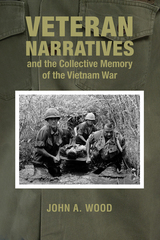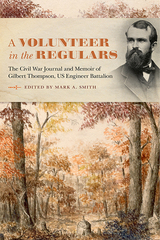6 start with V start with V

Captain Clark was a twenty-seven-year-old Knoxville businessman when the first shots of the Civil War were fired in 1861. Like many southern gentlemen, Clark was opposed to secession but could not desert his family and friends. Enlisting as a first lieutenant in the Confederacy’s Third Tennessee Infantry Regiment, he spent his first night as a soldier on the bloody battlefield of Manasses. Clark’s recollections of Manasses and the battles and skirmishes that followed pinpoint his regiment’s activities in previously undocumented areas while providing valuable analyses of battles from a participant’s point of view and discussing the irony many soldiers felt when battle pitted them against men they had known before the war in business, politics, and society.
Captured after the battle of Morristown in the fall of 1864, Clark was jailed in Knoxville, then under Federal control. His account of the eight months he spent as a prisoner—his harsh treatment, a near-fatal illness, the false accusations of traitorous activities—offer a detailed description of the physical and legal battles of a Confederate prisoner of war fighting to obtain his freedom. Clark’s post war experiences relate his struggles as a former Rebel living in a conquered state, reflecting the deeply divided loyalties of East Tennessee that continued for years after the war’s end.
This first book in the Voices of the Civil War series shares the story of a man who remained sensible of his kinship with those he was forced to call his enemies. Written a quarter-century after the war began, Clark's memories vividly bring to life the tragedy that was the Civil War.
Willene B. Clark, a granddaughter of Captain Clark, is a professor of art history at Marlboro College, Marlboro, Vermont.

Mass shootings have been on the rise in the United States since the early 2000s, but until the heartbreak of the 1 October 2017 Route 91 Harvest Music Festival, the citizens of Las Vegas had never experienced the violence and tragedy of this now all-too-frequent occurrence. That day, fifty-eight people were shot to death on site, while another two victims later died of their injuries. The 1 October incident physically wounded nearly 900 concert-goers, but psychologically impacted countless untold victims.
As individual and institutional response to urgent requests for help came in both during and after the 1 October catastrophe, those who call Las Vegas home struggled to cope with pain and grief. Now, editor Roberta Sabbath draws together a collection of personal essays, oral histories, interviews, scholarly writings, and commentaries to remember those whose lives were lost, and to honor survivors and their loved ones. Written five years after the tragedy, each contribution offers a unique story of healing, demonstrating the wide-ranging experiences and repercussions of the event. The essays in this collection represent a broad diversity of voices from political leaders, health professionals, first responders, community members, and incident survivors. This work is dedicated to those who lost their lives on 1 October 2017, to survivors and their loved ones, and to the caregivers—both individual and institutional—all of whom continue to keep Vegas Strong.

In the decades since the Vietnam War, veteran memoirs have influenced Americans’ understanding of the conflict. Yet few historians or literary scholars have scrutinized how the genre has shaped the nation’s collective memory of the war and its aftermath. Instead, veterans’ accounts are mined for colorful quotes and then dropped from public discourse; are accepted as factual sources with little attention to how memory, no matter how authentic, can diverge from events; or are not contextualized in terms of the race, gender, or class of the narrators.
Veteran Narratives and the Collective Memory of the Vietnam War is a landmark study of the cultural heritage of the war in Vietnam as presented through the experience of its American participants. Crossing disciplinary borders in ways rarely attempted by historians, John A. Wood unearths truths embedded in the memoirists’ treatments of combat, the Vietnamese people, race relations in the United States military, male-female relationships in the war zone, and veterans’ postwar troubles. He also examines the publishing industry’s influence on collective memory, discussing, for example, the tendency of publishers and reviewers to privilege memoirs critical of the war. Veteran Narratives is a significant and original addition to the literature on Vietnam veterans and the conflict as a whole.

important African-American war correspondent of his era, served in the
famed black Fifty-fourth Massachusetts Regiment, subject of the film Glory.
His letters from the front, published in the New York Weekly Anglo-African,
brilliantly detail two wars: one against the Confederacy and one against
the brutal, debilitating racism within his own Union Army. Together with
Donald Yacovone's biographical introduction detailing Stephens's life
and times, they provide a singular perspective on the greatest crisis
in the history of the United States.
Stephens chronicled the African-American
quest for freedom in reports from southern Maryland and eastern Virginia
in 1861 and 1862 that detailed, among other issues of the day, the Army
of the Potomac's initial encounter with slavery, the heroism of fugitive
slaves, and the brutality both Southerners and Union troops inflicted
on them.
From the inception of the
Fifty-fourth early in 1863 Stephens was the unit's voice, telling of its
struggle against slavery and its quest to win the pay it had been promised.
His description of the July 18, 1863, assault on Battery Wagner near Charleston,
South Carolina, and his writings on the unit's eighteen-month campaign
to be paid as much as white troops are gripping accounts of continued
heroism in the face of persistent insult.
The Weekly Anglo-African
was the preeminent African-American newspaper of its time. Stephens's
correspondence, intimate and authoritative, takes in an expansive array
of issues and anticipates nearly all modern assessments of the black role
in the Civil War. His commentary on the Lincoln administration's wartime
policy and his conviction that the issues of race and slavery were central
to nineteenth-century American life mark him as a major American social
critic.

That’s Pliny the Younger, writing to Tacitus about the eruption of Vesuvius in 79 CE, one of many volcanic eruptions that have become part of the story of human history. We have always, it seems, been simultaneously fascinated and terrified by volcanoes, and this book brings together an unforgettable selection of firsthand accounts from around the world and through the centuries.
In these pages, anonymous seventeenth-century seafarers tell of exploding islands, Alexander Von Humboldt and Charles Darwin show us volcanoes through the eyes of developing science, and artists sketch the spectacular London sunsets created by the eruption of Krakatoa, half the world away. As the years pass, words and paintings give way to the first photograph of an eruption, and eventually to detailed satellite imagery, but the awesome force of volcanoes still comes through, sublime and spectacular.
As we were reminded in 2010 when the eruption of Iceland’s Eyjafjallajökull snarled travel throughout Europe, volcanoes remain powerful and unpredictable even today. In the pages of this book, we can appreciate their majesty from a safe distance.

At the outbreak of the Civil War, Massachusetts native Gilbert Thompson joined the regular army, which assigned him to the engineer battalion, a unit that provided critical support for the Union military effort in building bridges and roads and surveying and producing maps. While serving, Thompson kept a journal that eventually filled three volumes. The author’s early education in a utopian community called Hopedale left him well read, affording a journal peppered with literary allusions. Once the war ended, Corporal Thompson added some postwar reflections to create a unified single volume, which editor Mark A. Smith has carefully arranged so that the reader can clearly distinguish between Thompson’s contemporary accounts and his postwar reminiscences. An accomplished artist and topographer, Thompson illustrated his journals, adding depth to his narrative with portraits of key figures, drawings of ordinary scenes such as soldiers playing chess, and sights of the war. Additionally, he collected photographs both during and after the war, many of which are included.
Thompson’s wartime musings and postwar recollections have much to offer. Few diaries contain glimpses into the workings of a highly specialized unit such as the engineer battalion, and Thompson’s skills in depicting daily camp life in both words and pictures provide a distinctive look at the Union Army during the Civil War as well as an insightful look into the human condition. In his 1879 introduction, Thompson writes, “I wonder how I wrote as much and as well, and am thankful I was so fortunate as to have the opportunity to do so.” Students of the Civil War will feel fortunate he did.
READERS
Browse our collection.
PUBLISHERS
See BiblioVault's publisher services.
STUDENT SERVICES
Files for college accessibility offices.
UChicago Accessibility Resources
home | accessibility | search | about | contact us
BiblioVault ® 2001 - 2024
The University of Chicago Press









